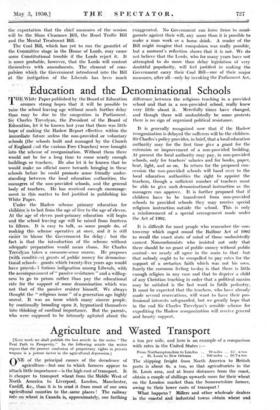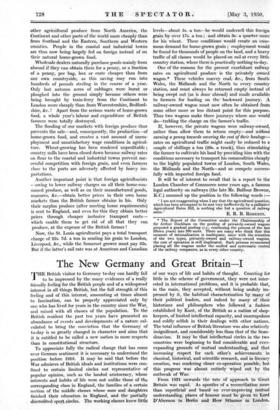Agriculture and Wasted Transport
[Next week -we shall publish the last article in the series "The Real Path to Prosperity." In the following artiCle the writer argues that the present . confusion of proprietary rights in private wagons. is a . Potent factor in the agricultural, depression.] fitiE • of the principal causes of the decadence of .‘-r agriculture—but one to which farmers appear to attach little importance—is the high cost of transport. It is :cheaper to transport, wheat from the Middle West of North America to Liverpool, London, Manchester, Cardiff, &c, than it is to send it -from most of our own agrieultural counties to the-same places ! The railway rate: on -wheat in Canada is, approximately, one farthing a ton per mile, and here is an example of a comparison with rates in the United States :— From Northamptonshire to London .. 70 miles .. 15f- a ton „ St. Louis to New Orleans .. 700 miles .. 10/7 a, ton The shipping freight from North America to British ports is about 6s. a ton, so that agriculturists in the St. Louis area, and at lesser distances from the coast, obtain a couple of shillings upwards more for their wheat on the London market than the Somersetshire farmer, owing to 'their lower costs of transport ! What happens ? Millers and other wholesale dealers in the coastal and industrial towns obtain wheat and other agricultural produce from North America, the Continent and- other the World more cheaply-than from Scotland and the Eastern, Southern and Western counties. People in the coastal and industrial towns are thus now being largely fed on foreign instead of on their natural home-grown food.
Wholesale dealers naturally purchase goods mainly from abroad if they can obtain them for a penny, or a fraction of a penny, per bag, box or crate cheaper than from our own countryside, as this saving may run into • hundreds of pounds sterling in the course of a year. Only last autumn acres of cabbages were burnt or ploughed into • the ground simply because others were being brought by train-ferry from the Continent to London more cheaply than from Worcestershire, Bedford- shire, &c. ! Apart from the serious waste of home-grown food, a whole year's labour and expenditure of British farmers were totally destroyed. .
The flooding of our markets with foreign produce thus prevents the sale—and, consequently, the production—of home-grown food, and creates a vast amount of unem- ployment and unsatisfactory wage conditions in agricul- ture. Wheat-growing has been rendered unprofitable ; country Mills have been closed down because railway rates on flour to the coastal and industrial towns prevent suc- cessful competition with foreign grain, and even farmers Close to the ports are adversely affected by heavy im- portations. Another important point is that foreign agriculturists —owing to lower railway charges on all their home-con- sumed produce, as well as on their manufactured 'goods, manures, &c.—obtain better prices in their own home markets than the British farmer obtains in his. Only their surplus produce (after meeting home requirements) is sent to England, and even for this they obtain better prices through cheaper inclusive- transport costs— which enable them to get rid of all that they can produce, at the expense of the British farmer !
Now, the St. Louis agriculturist pays a total transport charge of 22s. 7d. a ton in sending his grain to London, Liverpool, &c., while the Somerset grower must pay 25s. But if the latter's rail rate was at American and Canadian levels—about 5s. a ton—he would undersell, this foreign grain-by over 17s. a ton.; and obtain- 3s.. a quarter more for his wheat. These conditions would create an enor- mous demand for home-grown grain ; employment would be found for thousands of people on the land, and a heavy traffic of all classes would be placed on rail at every little country station, where there-is practically nothing to-day. - One of the reasons for the present exorbitant railway rates on agricultural produce is the privately owned wagon.* These vehicles convey coal,- &c., from South Wales, the Midlands and the North to every country station, and must always be returned- empty instead of being swept out (as is done abroad) and made available to farmers for loading on the ' backward journey. A railway-owned wagon must now often be obtained from some other more or less distant point for this purpose. Thus two wagons make three journeys where one would do—trebling the charge on the farmer's traffic. - If, however, the private wagons were railway-owned, rather than allow them to return empty—and withottl earning a penny towards covering the cost of their haulage— rates on agricultural traffic might easily be reduced to a couple of shillings a ton (20s. a truck), thus stimulating the farmer to cultivate his land by providing him with the conditions necessary to transport his commodities cheaply to the highly populated towns of London, South Wales, the Midlands and the North—and so compete success- fully with imported foreign food.
It will be of interest to recall that in a report to the London Chamber of Commerce some years ago, a famous legal authority on railways (the late Mr. Balfour Browne, K.C.) summed up the position in the following words :- "I am not exaggerating when I say that the agricultural question,- which has been attempted to be met very ineffectively by a palliative Agricultural Rates Bill, is nothing else but a question of railway rates." E. R. B. ROBERTS.
* The Report of the Committee under the Chairmanship of Sir Arthur Duckham on the pooling of privately-owned wagons proposed a gradual pooling- (i.e., continuing the process of the last fifteen years) into 200 units. There are many who think that this measure of rationalization is inadequate, since with the retention of the two types, privately-owned and railway-owned wagons, the cost of operation is still duplicated. Such persons recommenti placing all the wagons under the unified and systematic controJ of the railway companies, as in every other country.















































 Previous page
Previous page